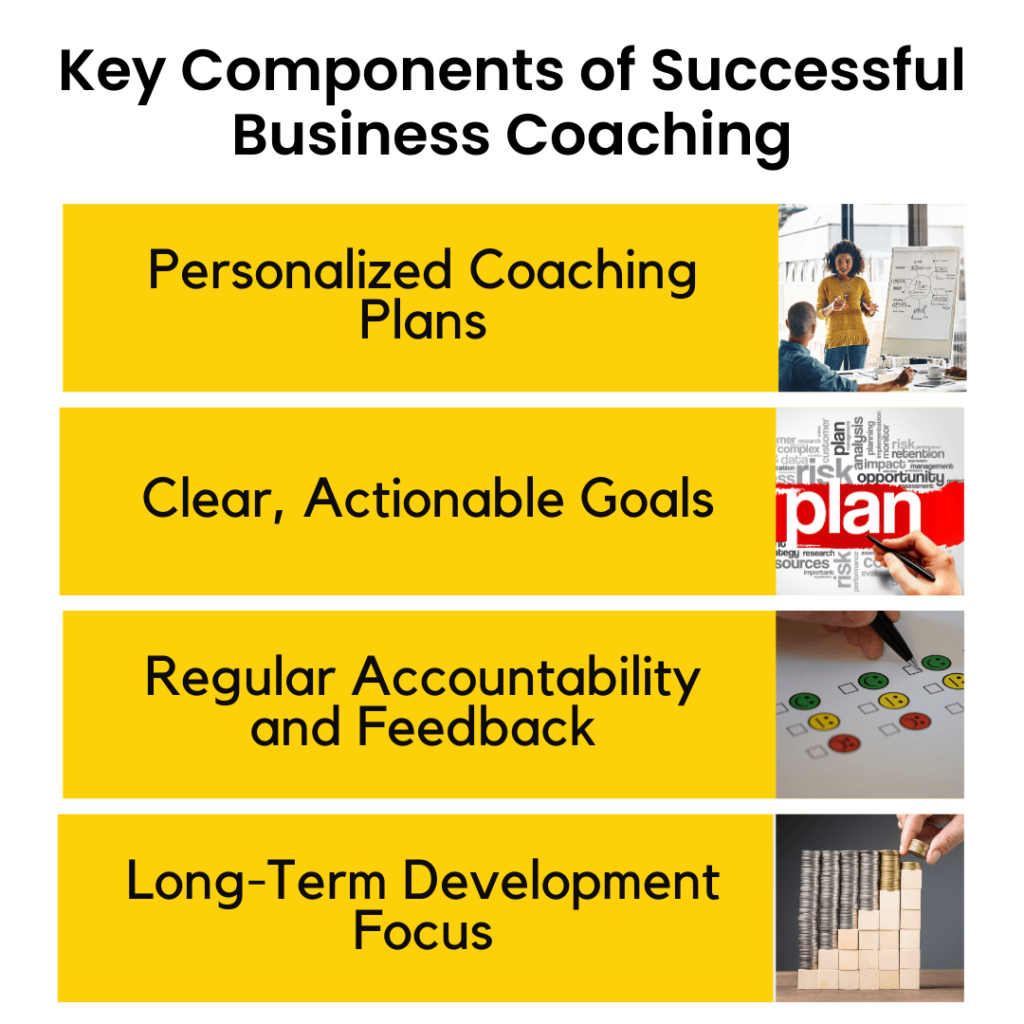Picture this: you’re a business leader juggling multiple responsibilities managing a team, hitting targets, and driving growth. Yet something feels off. Your team isn’t fully engaged, decisions are delayed, and the long-term vision seems unclear. The harder you push, the more strained things become. You ask yourself, What am I missing?
This is a common struggle for many leaders. Despite having skills and experience, they often lack the clarity and focus needed to elevate both their leadership and their organization. This is where business coaching comes in.
Business coaching offers an outside perspective, helping you sharpen leadership skills, set clear goals, and create actionable strategies. It equips you with the tools to inspire your team, solve problems, and align your organization for long-term success. Through tailored guidance and accountability, coaching transforms how you lead, driving sustained growth for you and your company.
Ready to overcome these challenges? Business coaching is the key to unlocking your leadership potential and driving real organizational success.
The Effectiveness of Business Coaching
Business coaching has emerged as a transformative tool for organizations and leaders striving for clarity, growth, and long-term success. It provides a tailored approach to leadership development, enabling leaders to sharpen their focus, refine their decision-making, and align their personal goals with the broader vision of the company. By targeting specific areas of improvement, coaching equips leaders with the skills and insights necessary to achieve measurable outcomes. Let’s dive into the key areas where business coaching proves most effective.
Clarity and Focus on Goals
One of the most significant benefits of business coaching is the ability to gain clarity on objectives. Many leaders struggle with juggling multiple priorities and can lose sight of their most important goals amid the day-to-day demands of running a business. Coaching addresses this by helping leaders zero in on the most critical aspects of their role and align them with the organization’s long-term objectives.
How it works:
Through guided sessions, a coach helps leaders break down overwhelming tasks into manageable steps, setting clear, actionable goals. This refined focus allows leaders to cut through distractions and direct their energy toward what matters most. For example, a leader who has been scattered between too many initiatives might identify their top priorities, ensuring that time and resources are allocated efficiently. Over time, this clarity leads to improved decision-making, higher productivity, and a more cohesive vision for the organization.
The result:
Leaders become more effective at making strategic choices, improving productivity, and staying aligned with the organization’s goals. This laser-focused approach minimizes wasted time and effort, leading to better overall outcomes.
Leadership Development: Beyond Skills to Strategy
Leadership is about more than just managing people or tasks; it’s about inspiring and leading teams toward a shared vision. Business coaching helps leaders not only improve the basic skills of managing a team but also fosters strategic thinking and vision-driven leadership. Coaches work with leaders to build essential leadership traits such as emotional intelligence, communication, and conflict resolution. However, the true impact of coaching goes beyond these skills by empowering leaders to guide their teams through complex challenges and toward innovation.
How it works:
Through reflective discussions and role-playing exercises, leaders enhance their emotional intelligence the ability to understand and manage their own emotions and the emotions of others. This makes them more effective in handling team dynamics, resolving conflicts, and motivating employees. In addition, coaching pushes leaders to think strategically developing skills in areas such as crisis management, resource allocation, and innovation leadership. For example, a leader facing a downturn in sales might use coaching to develop new product strategies or pivot the team’s focus toward untapped markets.
The result:
Leaders who undergo coaching don’t just improve in day-to-day tasks, they are equipped to drive the organization’s vision, navigate crises with confidence, and lead their teams toward sustained performance and growth.
Accountability and Progress: Measurable Success
One of the greatest benefits of business coaching is the accountability it brings. In many cases, leaders know what they need to do but struggle with the execution due to distractions or competing priorities. Coaches serve as accountability partners, keeping leaders focused on their goals and ensuring they remain consistent in their efforts.
How it works:
Through regular check-ins and progress tracking, coaches ensure that leaders stay on course. This continuous monitoring pushes leaders to follow through on their commitments, whether it’s improving a specific leadership trait or driving a particular business initiative. Think of coaching as having a personal fitness trainer for your professional life. there’s someone to track your progress, help you set benchmarks, and adjust strategies when necessary. This accountability often translates into measurable business outcomes such as an increase in sales, improved employee performance, or greater operational efficiency.
The result:
With coaching, leaders experience consistent forward momentum. Measurable improvements in team productivity, efficiency, and overall business performance occur because goals are not just set they are consistently tracked, reviewed, and achieved.
Problem-Solving and Decision-Making: Strategic Impact
Business coaching significantly enhances problem-solving and decision-making abilities by encouraging leaders to view challenges from different perspectives. Rather than rushing to make decisions, coaching teaches leaders to pause, assess the situation critically, and explore alternative solutions. This deeper level of thinking leads to better decision-making and more strategic problem-solving.
How it works:
Coaches help leaders develop a framework for tackling complex issues. This involves dissecting a problem into its components, understanding its root causes, and brainstorming solutions. Leaders learn to weigh potential outcomes, consider long-term impacts, and make more informed decisions. For instance, when a company faces a sudden market disruption, a coach might guide the leader through scenario planning considering how different strategies could play out, and which would offer the best results for the organization.
The result:
Leaders become more agile and strategic in their approach to problems. They make smarter, more informed decisions that have a positive impact on the business, ultimately positioning the company for sustained success in a competitive market.
Personal and Professional Growth: Resilience and Adaptability
Business coaching goes beyond improving professional performance; it also fosters personal growth. By working with a coach, leaders can identify and confront blind spots or self-limiting beliefs that may be holding them back. More importantly, coaching helps leaders develop resilience and adaptability, two key traits in today’s constantly changing business environment.
How it works:
Coaching sessions encourage leaders to reflect on their personal strengths and weaknesses. Through this self-awareness, they gain the confidence needed to tackle new challenges and overcome setbacks. Leaders are also taught to adopt a growth mindset, where they view challenges as opportunities for improvement rather than obstacles. For example, a leader dealing with high employee turnover might realize through coaching that they need to improve their engagement and retention strategies, shifting from a reactive to a proactive leadership style.
The result:
Leaders develop resilience and adaptability, allowing them to navigate uncertainties more effectively. They not only grow professionally but also gain the personal confidence to lead through adversity. This personal growth ultimately strengthens the leader and the organization, building a culture of resilience that can weather change and drive sustained success.
Key Components of Successful Business Coaching
For business coaching to have a lasting impact, several essential components must be in place. These foundational elements ensure that coaching not only addresses immediate needs but also supports long-term growth.
Personalized Coaching Plans
Every leader operates within a unique set of challenges and opportunities, so effective coaching begins with a customized plan. Coaches assess the leader’s individual strengths, areas for improvement, and the organization’s goals to create a plan that addresses specific needs. This tailored approach ensures that coaching remains relevant and directly contributes to both personal and organizational development.
Clear, Actionable Goals
Coaching is most effective when it focuses on clearly defined, measurable goals. By breaking down larger ambitions into smaller, achievable milestones, leaders and organizations can track progress and stay focused on their priorities. These goals act as a roadmap, guiding decision-making and keeping the leader aligned with the organization’s long-term vision.
Regular Accountability and Feedback
Progress thrives on accountability. Through regular check-ins and constructive feedback, coaching ensures that leaders stay on track toward their goals. This continuous feedback loop helps leaders adjust their approach when needed and keeps them focused on long-term objectives, ultimately fostering consistent growth and development.
Long-Term Development Focus
Coaching is not just about quick fixes or solving immediate problems, it’s about fostering lasting change. The best coaching helps leaders develop skills and mindsets that will serve them well into the future. By emphasizing adaptability and continuous learning, coaching enables leaders to evolve with their roles, preparing them for future challenges and opportunities.
These elements are crucial for coaching to deliver meaningful, sustained value, ensuring that leaders grow not just during the coaching process, but long after it has concluded.

Long-Term Benefits of Business Coaching
The true value of business coaching goes beyond immediate improvements; it lies in the long-term benefits that continue to shape leadership and organizational success well after the coaching sessions have concluded. Here’s how these lasting advantages fuel sustainable growth:
Sustained Leadership Growth
Business coaching cultivates self-aware leaders who are better equipped to guide their teams, even under pressure. By developing emotional intelligence and refining leadership strategies, leaders become more adaptable and resilient. Over time, this leads to more confident, decisive leaders who can handle crises and steer the organization through uncertainty with a steady hand. As they grow, these leaders inspire greater trust and loyalty from their teams, creating a ripple effect that strengthens the organization from the top down.
Improved Team Performance
Coaching not only enhances the leader’s abilities but also positively impacts the performance of their teams. Through better communication, conflict resolution, and collaborative leadership, coaches help leaders create high-functioning, cohesive teams. These teams are more engaged, efficient, and aligned with the organization’s goals. Over time, this improved teamwork boosts productivity and fosters a work environment where innovation and problem-solving thrive. Leaders who consistently apply coaching insights create a culture of high performance that endures and evolves with the team.
Strategic Decision-Making
One of the most valuable long-term benefits of coaching is the development of sharper decision-making skills. Leaders learn to evaluate challenges from multiple angles, make well-informed decisions, and allocate resources more effectively. As a result, their decisions are more aligned with the company’s strategic objectives and long-term growth. This ongoing ability to think critically and make better choices ensures that the organization remains on a path of sustained success, even in a competitive and changing market. Over time, this habit of strategic thinking leads to more efficient processes, cost savings, and improved business outcomes.
Organizational Agility
In today’s fast-evolving business landscape, the ability to adapt to change is critical for long-term survival. Business coaching fosters a mindset of flexibility and innovation within leaders, empowering them to pivot when market conditions shift or when internal changes are needed. By embedding a culture of agility in the leadership team, the organization becomes more responsive and better prepared for disruption. This adaptability ensures the organization can seize new opportunities, remain competitive, and stay ahead of industry trends, positioning it for continued growth.
Cultural Transformation
The most profound and lasting impact of coaching is often seen in cultural transformation. Coaching instills a culture of accountability, collaboration, and continuous improvement, helping leaders foster an environment where everyone feels empowered to contribute. As leaders grow through coaching, they model these values for their teams, creating a workplace where innovation and accountability are embedded in daily operations. This cultural shift leads to higher employee engagement, lower turnover, and a stronger alignment with the company’s mission and values, ensuring that the organization’s success is sustainable for the long haul.
Conclusion
Business coaching is a game-changer, driving leadership development, improving accountability, and delivering measurable results that benefit the entire organization. It helps leaders sharpen skills, set clear goals, and build stronger teams, creating long-term success beyond the coaching sessions.
Ready to see the impact? Explore how business coaching can help you or your organization thrive. Let’s connect and start your growth journey today.





